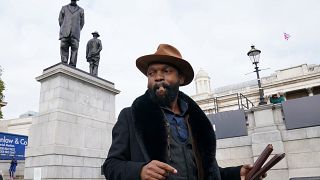Controversy
Toppled in Belgium, still standing in the Kinshasa, the capital of the DR Congo. Residents reacted to the fall of the statue of King Leopold II, a symbol of colonial atrocities. The man who led the first European efforts to exploit the Congo River basin,
There are mixed reactions generally in the streets of Kinshasa over events in Europe where anti-racism protests that spread from the United States continues to impact colonial history across the ocean.
For Pitchou Kangudie, a businessman; the time has come for the toppling of slavery monuments however late: “I think they got to it too late.
“This monument should have been vandalized a long time ago because he made the Congolese suffer a lot: our ancestors enslaved, arms cut off. He did a lot of harm in Congo, this monument really deserves to be vandalized.”
But for José Batekele, director of the collection of the National Museum of Mont-Ngaliema, there is more to the person of the controversial colonialist: “Leopold II, for us, is a part of our history, a memory, a reference for our children.
“So history, whether it is bad or good, remains history, because there are schools here, we teach our children the history of the Congo, pre-colonial, colonial and post-colonial history.”
Moïse Tangamo, a banker thinks currents events are a good reawakening in the context of history: “Regarding Leopold II, people will say that this is the past, but it is a past that was traumatic for the indigenous Congolese people who lived through it.
“And I think that the real story must be told in schools and universities so that everyone knows what really happened during slavery and colonization in Africa in general.”
Statues of Leopold II, the second king of the Belgians, were recently vandalized in Brussels, including the statue located not far from the densely populated Matonge district of Congolese origin.
The king, who ruled Belgium from 1865 to December 1909, remained famous for the conquest of the Congo.











01:52
In Goma, solar power brings light and hope in Ndosho neighbourhood
01:39
Juneteenth celebrations marking the end of slavery in United States
01:52
Why Juneteenth matters: the day slavery truly ended in the U.S.
00:08
Vatican beatifies Congolese customs worker killed in 2007 for refusing bribe
01:49
UN warns of impact Sudan's humanitarian crisis is having on Chad
11:18
Africa Day: AU renews call for reparative justice {Business Africa}